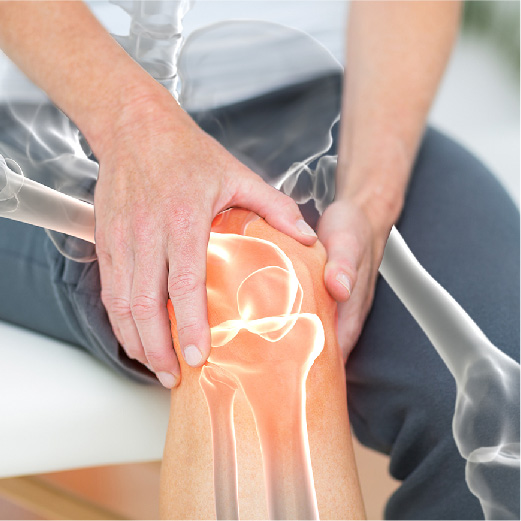
Patellofemoral Pain Syndrome
The patellofemoral joint is at the front of the knee joint. It’s important in how we walk and allows us to effectively straighten our legs.
The position of the patella (our kneecap) is dependent on muscle balance and the alignment of your leg. When this muscle balance isn’t correct for the patello-femoral joint it can cause a sore leg and knee pain when we take part in certain activities.
Meniscal Tears
There are two main types of cartilage in the knee joint. Articular cartilage covers the joint surfaces of the femur and the tibia. This is designed to protect the bony surfaces in the joint and to help with joint movement.
Meniscal cartilage forms to rings in the medial and lateral compartments of the knee joint. It is designed to act as a shock absorber when we put weight through our knees. Damage to the meniscal cartilage can cause pain, decreased range of movement or locked-knee.


Ligament Tears of the Knee
Your knee is very mobile when moving forwards and backwards, however it is not designed to move from side-to-side. In order to help prevent these types of movements, the medial and lateral collateral ligaments provide support to the inside and outside of the knee joint.
To prevent the tibia (shin bone) moving forward or backwards during movement, the anterior cruciate ligament (ACL) and posterior cruciate ligament (PCL) provide support from inside the knee joint. Excess force in the wrong direction can strain or tear these ligaments, resulting in pain or instability at the knee.
Physio For Knee Pain - FAQ
Do I need a scan for my knee pain?
You may need a scan if you experienced your knee injury through some form of trauma or sporting injury. This scan will be to determine if there has been damage to any important ligaments or the cartilage inside your knee. Our experienced physiotherapists will be able to guide you on whether this is appropriate and can help you to organise a referral. In a large majority of cases, scans are not required as a thorough physical assessment can tell us a lot about the condition of your knee.
Will my knee pain get better?
In most cases, yes. Injuries to the knee are often very treatable with physiotherapy. Your physiotherapist will be able to assess your knee to determine the true cause of your knee pain, and then will come up with a treatment plan specifically designed to alleviate pain. Most knee injuries should improve within 12 weeks with the correct treatment plan, but your physiotherapist will be able to give you a more specific timeline for your injury. Some sports or traumatic injuries may require surgical intervention, depending on your presentation, but your physiotherapist will guide on whether this is required or not.

